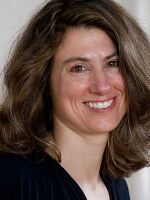My daughter’s preschool friend Diya - Sanskrit for “Lamp” – had a smile and a thoughtful demeanor that lit up every room she entered. She also had a rare genetic disorder that occasionally made her muscles break down, once becoming so weak and painful that she couldn’t walk. But these eruptions became increasingly rare, and she lived a relatively normal life.
I began teaching yoga at my daughter’s preschool. Soon after, Diya’s father Roopesh joined one of my adult classes. So for a while, I had a father and daughter as students, a rare gift.
In September 2009, Diya and my daughter moved to different schools for kindergarten. Each week during my adult class, though, Roopesh and I shared news about our daughters. In October, my daughter danced at Diya’s birthday party, and in March we quietly celebrated the arrival of Diya’s brother.
The day before Father’s Day that spring, Diya became ill and went to the hospital. Within a few hours, her heart stopped. The ER doctors couldn’t restart it, and they cried.
At the end of every yoga class, we practice a pose called Savasana, or corpse, where we lie down and rest. It serves the physiological purpose of quieting our nervous systems after an exhilarating class. But it also serves the deeper spiritual purpose of allowing ourselves to practice surrendering for the final event in our lives: our deaths. On a bad day in corpse, I mentally revise my grocery list, but on a good day I find an inner stillness so deep that I almost forget who I am.
My years of practice, though, didn’t prepare me for the death of a student or a student’s child, or for seeing her in an open casket, or for seeing her casket lowered into the ground. They didn’t help me tell my daughter that her friend was gone.
A few weeks later, Roopesh returned to my yoga class. I was grateful that he came, but again, my years of practice left me uncertain about how to respond when he quietly broke down in class each week. Each time he wept, I felt ambivalent – a horrible mixture of guilt and gratitude for having a daughter to hug every day.
I only found solace in the first, most basic thing I learned in a yoga class when I experienced intense pain: to just breathe.
The following June, as Diya’s family prepared to move out of town, they came to our home to plant an apple tree in her memory. Diya’s brother, Nikhil, then a toddler, flashed his sister’s bright smile.
As Roopesh covered the roots with soil, Diya’s mother Sumitha said “She’s still with us.”
I gaze at Diya’s tree every day. In September and October when the apples ripen, I imagine Diya picking them, something she loved. When I see it flower in May, I remember Diya doing an impressive backbend in a pink party dress. In June, though, I think of Roopesh, and all fathers who’ve lost children.







